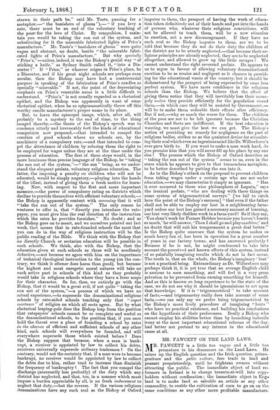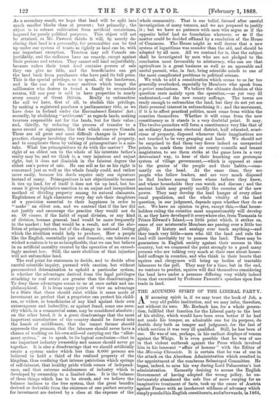MR. FAWCETT ON THE LAND LAWS.
MR. FAWCETT is a little too vague and a little too premature in his discourses on the Land Laws. He mixes up the English question and the Irish question, primo- geniture and the petite culture, free trade in land and peasant proprietorship, until he frightens owners without attracting the public. The immediate object of land re- formers in Ireland is to change tenants-at-will into copy- holders without confiscation ; the immediate object in Eng- land is to make land as saleable an article as any other commodity, to enable the cultivation of corn to go on on the same conditions as any other more profitable manufacture.
As a secondary result, we hope that land will be split into much smaller blocks than at present ; but primarily , the object is to release cultivation from artificial restrictions, imposed for purely political purposes. This object will not be attained, as Mr. Fawcett thinks it will, by merely de- claring that land is a personalty, for personalties can be tied up under our system of trusts as tightly as land can be, with one important exception. Trustees may sell Consols un- justifiably, and the sufferers have no remedy, except against their persons and estates. They cannot sell land unjustifiably, because unless their trust deed contains powers of sale they can give no title, and the beneficiaries can get the land back from purchasers who have paid its frill price. This is the special privilege, so to speak, of the landowner, and is the one of the many motives which tempt the millionaire who desires to found a family to accumulate estates, till one peer is said to have properties in nearly
every county of Great Britain. Really to enfranchise the soil w- e have, first of all, to abolish this privilege, by making a registered purchase a parliamentary title, as we have done in Ireland under the Encumbered Estates' Act ; secondly, by abolishing "settlement" as regards lands, making trustees responsible not for the lands, but for their value ; and, thirdly, by reducing the process of transfer to a mere record or signature, like that which conveys Consols. These are all great and most difficult changes in law and practice, changes involving the very foundations of property, and to complicate them by talking of primogeniture is a mis- take. What has primogeniture to do with the matter ? The right of an eldest son to the whole of his intestate father's realty may be, and we think is, a very injurious and unjust right, but it does not diminish in the faintest degree the eldest son's power of sale. He can sell as far as his right is concerned just as well as the whole family could, and rather more easily, because his deeds require only one signature instead of many. Primogeniture is not objectionable because it ties up land, for of itself it does not tie up land, but be- cause it gives legislative sanction to an unjust and inexpedient method of dividing property among its natural claimants. Englishmen of high character every day rob their daughters of a provision essential to their happiness in order to " make " an eldest son, and we contend that if the law did not justify and encourage the practice they would not do so. Of course, if the habit of equal division, or any kind of division, became general, land would be more frequently in the market ; but that would be a result, not of the abo- lition of primogeniture, but of the change in national feeling which the abolition would help to produce. How a people like the English, essentially just and domestic, can tolerate so wicked a custom is to us so inexplicable, that we can but believe in an artificial morality created by the operation of an exceed- ingly ancient law. Still, the mere abolition of that injustice will not enfranchise land.
The real point for statesmen to decide, and to decide after careful scientific inquiry, pursued with caution, but without preconceived determination to uphold a particular system, is whether the advantages derived from the legal privileges attaching to real estate are greater than the disadvantages. To deny those advantages seems to us at once unfair and un- philosophical. It is from many points of view an advantage to a State that there should exist within it some mode of investment so perfect that a proprietor can protect his child- ren, or widow, or beneficiaries of any kind against their own extravagance and imbecility, or against fraud, some one secu- rity which, in a commercial sense, may be considered absolute ; on the other hand, it is a great disadvantage that the most important manufacture of the country should be forced into the hands of middlemen, that the tenant farmer should supersede the yeoman, that the labourer should never have a chance of working on his own soil—of carrying out the "allot- ment system," so to speak, to its logical conclusion—that in one important industry ownership and usance should never go together. It is also a disadvantage that we should artificially create a system under which less than 8,000 persons are believed to hold a third of the realized property of the kingdom, thus confining that intense patriotism which springs of self-interest, that healthy pride which comes of independ- ence, and that extreme sedulousness of industry which is developed by ownership to a limited class. It is the balance of these things which has to be struck, and we believe the balance inclines to the free system, that the great benefits derived or derivable from the existence of one perfect security for investment are derived by a class at the expense of the whole community. That is our belief, formed after careful investigation of many tenures, and we are prepared to justify it ; but we have no patience with men who argue as if the opposite belief had no foundation whatever, or as if the• matter could be decided offhand by a resolution of the House- of Commons. The House might as well decree that a new system of logarithms was sounder than the old, and should be adopted by all men. All we contend for is, that the subject shall be investigated by men who are not pledged to the conclusion most favourable to aristocracy, who can see that agriculture is a great business as well as an agreeable and useful pursuit, who, in fact, bring scientific minds to one of the most complicated problems in political science.
We wish to add a consideration which seems to us far too generally overlooked, especially by Members who speak from
a priori conclusions. We believe the ultimate decision of this question rests mainly upon the operation,—as yet very ill
understood,—of the new county suffrage. The towns are ready enough to enfranchise the land, but they do not yet see their personal interest in enfranchising it ; and the movement, if it is to affect practical politics, must come from within the counties themselves. Whether it will come from the new constituency as it stands is a very doubtful point. It may. The twelve-pounders will form a constituency very like that of an ordinary American electoral district, half educated, avari- cious of property, disposed whenever their imaginations are not touched to be very grasping and hard. We should not be surprised to find them very fierce indeed on unexpected points, to mark them insist on county councils and tenant magistrates, to see them strike at the game laws in a very determined way, to hear of their knocking our grotesque system of village government,—which is opposed at once- to the genius of the people and their habits,—sum marily on the head. At the same time, they are people who follow leaders, and are very much disposed to find leaders among those whose fathers they knew,
and whose households they can watch and discuss ; and the- ancient habit may greatly modify the exercise of the new power. They may develop the land hunger of every other-
rural population, and the whole vitality of the land question, in our judgment, depends upon whether they do or not. We have no opinion to give, except this,—that house- holders ruling the counties most unquestionably will develop it, as they have developed it everywhere else, from Tasmania to Prince Edward's Island,—a little point which, it strikes us, some of our aristocratic Members are passing over a little too glibly. If history and analogy ever teach anything—and they teach very little—men who till the land and rule the land will inevitably try to possess the land. There may be guarantees in English society against their success in this country, but we commend the point strongly to a good many persons who are talking very much at their ease about house- hold suffrage in counties, and who think in their hearts that squires and clergymen will bring up bodies of tractable labourers to the poll. They may for a time, but in the end, we venture to predict, squires will find themselves considering the land laws under a pressure differing very widely indeed from that exercised by Professor Fawcett's speeches upon free- trade in land.



































 Previous page
Previous page